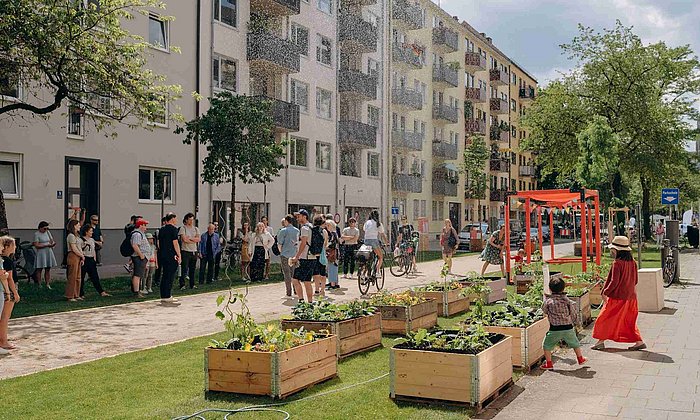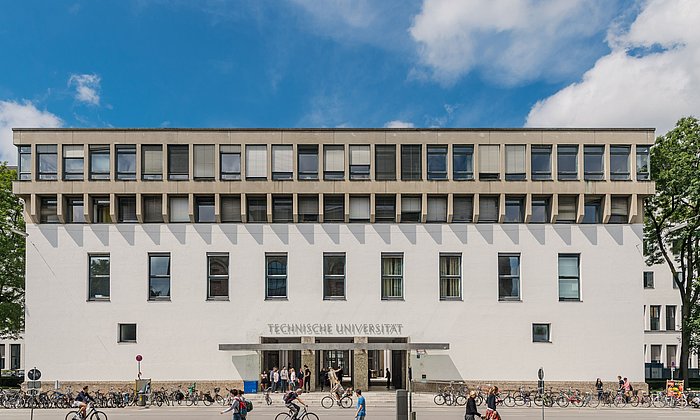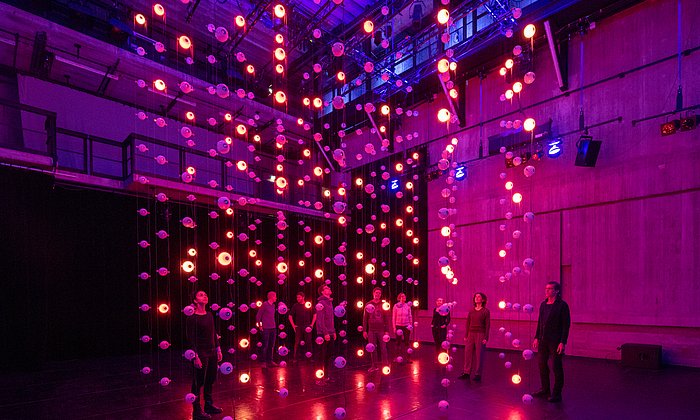Project week with the TUM Center for Culture and Arts
A week at the theater

Upon entering the theater’s carpentry workshop, Shend was immediately impressed. “So much work goes into every detail,” the Mathematics student marveled. So many people, technical crews and ideas combine and coalesce to enchant the audience once the curtain rises – and, perhaps, inspire them to think differently about the world around them.
During their tour of the Münchner Kammerspiele, Shend and five other TUM students walked past the wing entrances, along countless corridors and through a whole host of workshops. This excursion was part of a project week: a special teaching format during which students work together on a specific subject during a week-long project.
“I had no idea that it would be so much theater-related,” said Tengman, who studies Mechanical Engineering. “I just thought the topic sounded interesting.” The students’ assignment? To spend a week experimenting with video, language, painting and theater techniques, working with artistic forms to develop a vision for life in the future. The ultimate aim would be to create a new civilization in a distant galaxy. “The creative approach intrigued me,” said Micaela, an Electrical Engineering and Information Technology student.
Teaching staff at TUM can apply for the project week funding in the winter semester 2024/25 until April 21, 2024. For the first time, project weeks may be offered all semester long.
This special teaching format creates a framework in which students and lecturers can work across disciplines, curricula and locations on issues and projects that particularly interest them. Whether sustainability, digitization, artificial intelligence or entrepreneurship: many of the most pressing issues of our time transcend disciplinary boundaries.
Cultural inspiration to broaden horizons
The project week was hosted by the TUM Center for Culture and Arts (CCA), an institution recently established with the aim of connecting science with culture and the arts. The CCA program invites people from across the university community to engage with arts and culture with the aim of inspiring them and broadening their horizons.
“We’re creating connections and fueling intellectual vitality,” says Felix Mayer. The conductor and honorary professor has been appointed Artistic Director of the newly founded CCA. Whether it’s facilitating interdisciplinary exchange or strengthening the relationship between science, academia and wider society, Mayer believes that the arts can help people to see things from other perspectives – and understand themselves better, too. “If I want to achieve something substantial, I have to open my mind to the world.”
Mayer has conducted the Munich Symphonic Ensemble at Advent concerts since 2008, along with the TUM Choir since 2012. He often experiences that the love of music connects people working in different disciplines, and believes that art instills a special kind of motivation in people. “Why do people still attend orchestra rehearsals after a long day at work? It’s because art enriches us in a very special way.”
Together with his team, Mayer is building a new cultural program at the CCA. It includes a teaching program hosted in collaboration with Science–Technology–Society, a transdisciplinary program at the TUM School of Social Sciences and Technology. In addition, Mayer and his team are valuable contacts for student initiatives and ensembles on campus.
Last but by no means least, they hope to bring the campus to life through cultural events. Preparations are currently underway for an arts and culture festival in Munich this summer. In December 2023, TUM celebrated the establishment of the CCA at the Isarphilharmonie and through an exhibition called “Nobel Heroes” by photographer Peter Badge, in which portraits of Nobel Prize laureates were installed in the Matriculation Hall.
What will life look like in the future?
Back to the Kammerspiele: the students’ tour ended on the roof of the theater, in a room with light pouring in through the windows. They had just visited workshops and rehearsal stages to see preparations for the première of “Land”, a piece centered around climate change, sustainability and how people have relied on the natural world for their livelihoods for centuries. “Now,” Julia Maier told the students, “it’s your turn.” Maier, who oversees artistic education at the Kammerspiele, accompanied the students during their visit. She had a question for the group: “Drawing on your technical background, what do you think the future might look like?”
Maier then assigned roles to the group, who read through the unreleased script for “Land”. After that, the students began to write, draw and discuss. While the upcoming play ended in the near present, the students were tasked with looking ahead. Their attention soon turned to biorobotics, vertical farming, genetic engineering, virtual reality – and the question of how much of the natural world will remain intact in 50 or even 500 years.
Julia Maier is part of building up the cooperation between TUM and the Kammerspiele – that is, between a University of Excellence and the Munich theater which is regarded as one of the finest in the German-speaking world. This cultural partnership has an apt name: Art meets Technology.
It aims to attract new audiences but also to enter into a dialogue on the social issues raised by the theater. “Young people studying engineering and the sciences often have a less obstructed perspective on things,” says Maier. “They engage with theater very differently.”
In addition to reduced ticket prices for students, this collaborative endeavor also offers exclusive meetings with artists and experts, plus workshops through the MK:Campus initiative.
Courage is crucial
A few days later, Shend, Tengman, Micaela and their fellow students staged their play at the Kammerspiele’s Theaterlabor in Neuperlach. The audience was made up of members of other project week teams. There was still a little work to do to prepare the backdrop, improvise a screen and transform a box into a robot with some silver foil. At the control desk, Micaela and Tengman stood ready with the background presentation, complete with videos, images and music. Every member of the team was fully focused on their task.
Their instructor Ingrid Lughofer, a freelance dramatic advisor, was also present, having accompanied the students throughout the week and helped to provide direction for their ideas. “It sometimes takes a dose of courage to test out your own creativity,” says Lughofer. “However, the students gain a lot of confidence in the process.”
The applause at the end was the students’ reward for their courage as well as the play itself. The two-scene performance ended in a striking sci-fi scenario, in which a humanoid pilot discovers her own corpse on a spaceship. As it turns out, the pilot is a replacement clone tasked with transporting a ship filled with embryos to a new world. Docked with an asteroid to drill for fuel, the ship hitches a ride through a distant galaxy.
Technical University of Munich
Corporate Communications Center
- Kolja Kröger
- presse@tum.de
- Teamwebsite
Contacts to this article:
TUM Center for Culture and Arts (CCA)
Augustenstr. 44, 2nd floor
80333 Munich
info.cca@lll.tum.de






